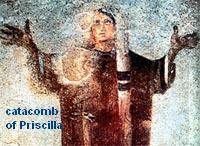When we teach about the early church, we frequently omit the story of spiritual gifts.

Cessationism is the belief that the miracles of Jesus’ lifetime and the apostolic period happened solely to attest to the authority and inspiration of the apostolic writings, and that miracles and extraordinary spiritual gifts ceased after the writing of the apostolic documents was concluded.
As writers such as ex-Dallas Seminary professor Jack Deere have argued, this is a position with no biblical foundation. But it also has a problem with the historical record. That record shows clearly that the early church was quite active in the charismatic gifts at least through 200 AD. There was a decline in the 3rd century, and then again it became active.
Sadly, many writers and teachers who are not cessationist continue to give the impression that miracles and extraordinary gifts were phenomena limited to the apostolic period. The way the early church is usually taught, we hear much about martyrdom and persecution; much about Gnostics and Arians and doctrinal disputes; much about how bishops and clergy roles evolved, and how the apostolic tradition was passed down and the canon of the New Testament evolved.
We hear how Tertullian scoffed at those who tried to translate the gospel into the categories of Greek philosophy; how Origen of Alexandria nearly single-handedly invented the systematic study of the Bible; how Irenaeus defended the faith against a host of heresies and spoke of the Work of Christ in illuminating new ways; how Cyprian insisted on the unity of the church and its necessity for salvation.
What we don’t usually hear is how these same august teachers and bishops from the 100s and 200s AD and beyond – Tertullian, Cyprian, Irenaeus, and many more – talked about miracles of healing, prophecy, and exorcism as everyday occurrences in the church. Tertullian is typical when he says “God everywhere manifests signs of his own power – to his own people for their comfort, to strangers for a testimony unto them” (Tertullian, A Treatise on the Soul).
In other words, we are usually not told that the early Christian church was a charismatic church. I use this term in its technical sense: the community of Christians in the 100s and 200s continued to experience the charismata, the spiritual gifts, described by the Apostle Paul in his first letter to the Corinthians.
The 19th-century church historian Adolf Harnack, in his Mission and Expansion of Christianity, explored this seldom-seen side of the early church. From the mouth of the influential bishop of Carthage, Cyprian, for example, we hear this:
In Christianity there is conferred (upon pure chastity, upon a pure mind, upon pure speech) the gift of healing the sick by rendering poisonous potions harmless, [143] by restoring the deranged to health, and thus purifying them from ignominious pains, by commanding peace for the hostile, rest for the violent, and gentleness for the unruly, by forcing – under stress of threats and invective – a confession from unclean and roving spirits who have come to dwell within mankind, by roughly ordering them out, and stretching them out with struggles, howls, and groans, as their sufferings on the rack, by lashing them with scourges, and burning them with fire. This is what goes on, though no one sees it; the punishments are hidden, but the penalty is open. Thus what we have already begun to be, that is, the Spirit we have received, comes into its kingdom. (Harnack, 142-3)
Harnack’s list
Harnack goes on to categorize the charismatic activities of the 2nd- and 3rd-century church – and the list is impressive:
(1) God speaks to the missionaries in visions, dreams, and ecstasy, revealing to them affairs of moment and also trifles, controlling their plans, pointing out the roads on which they are to travel, the cities where they are to stay, and the persons whom they are to visit. Visions occur especially after a martyr?dom, the dead martyr appearing to his friends during the weeks that immediately follow his death, as in the case of Potamiaena (Eus., H.E., vi. 5), or of Cyprian, or of many others.
It was by means of dreams that Arnobius (Jerome, Chron., p. 326) and others were converted. Even in the middle of the third century, the two great bishops Dionysius and Cyprian’ were both visionaries. . . .
(2) At the missionary addresses of the apostles or evangelist, or at the services of the churches which they founded, sudden movements of rapture are experienced, many of them being simultaneous seizures; these are either full of terror and dismay, convulsing the whole spiritual life, or exultant outbursts of a joy that sees heaven opened to its eyes. The simple question, “What must I do to be saved?” also bursts upon the mind with an elemental force.
(3) Some are inspired who have power to clothe their experience in words-prophets to explain the past, to interpret and to fathom the present, and to foretell the future. Their prophecies relate to the general course of history, but also to the fortunes of individuals, to what individuals are to do or leave undone.
(4) Brethren are inspired with the impulse to improvise prayers and hymns and psalms.
(5) Others are so filled with the Spirit that they lose con?sciousness and break out in stammering speech and cries, or in unintelligible utterances – which can be interpreted, however, by those who have the gift.
(6) Into the hands of others, again, the Spirit slips a pen, either in an ecstasy or in exalted moments of spiritual tension; they not merely speak but write as they are bidden.
(7) Sick persons are brought and healed by the missionaries, or by brethren who have been but recently awakened; wild paroxysms of terror before God’s presence are also soothed, and in the name of Jesus demons are cast out.
(8) The Spirit impels men to an immense variety of extraordinary actions – to symbolic actions which are meant to reveal some mystery or to give some directions for life, as well as to deeds of heroism.
(9) Some perceive the presence of the Spirit with every sense; they see its brilliant light, they hear its voice, they smell the fragrance of immortality and taste its sweetness. Nay more; they see celestial persons with their own eyes, see them and also hear them; they peer into what is hidden or distant or to come; they are even rapt into the world to come, into heaven itself, where they listen to “words that cannot be uttered.”
Burgess’s timeline
In the twenty-first century, Pentecostal scholar Stanley M. Burgess updated and deepend Harnack’s testimony on this matter. For his The New International Dictionary of Pentecostal and Charismatic Movements (Zondervan, 2002), Burgess created an absorbing 8-page timeline summarizing his three-volume study, The Holy Spirit: Ancient Christian Traditions; Eastern Christian Traditions; and Medieval Roman Catholic and Reformation Traditions. Like Harnack’s list, Burgess’s timeline shows that the early centuries are full of charismatic phenomena.
Here are just a few high points noted by Burgess, supporting his claim that the Holy Spirit has empowered ordinary Christians through the centuries – with jaw-dropping results:
1st century
Writers of the Didache and the Shepherd of Hermas [two inspirational books used widely in the early church] witness so much charismatic activity they find it necessary to distinguish between true and false prophets. At about the same time, the writer of Pseudo-Barnabas suggests prophetic ministry is normative in the church.
2nd century
[Christian apologist] Justin Martyr argues that God has withdrawn the Spirit of prophecy and miracles from the Jews and has transferred it to the church as proof of her continued divine favor.
Irenaeus of Lyon describes the gifts of prophecy, discernment of spirits, and exorcism in his Gallic church, and even mentions that individuals have been raised from the dead. He warns against certain false Gnostics who fabricate spiritual gifts to win favor with the na?ve.
3rd century
Origen of Alexandria says healings, exorcisms, and validating signs and wonders continue to be experienced in the church. Just as miracles and wonders added to the credibility of 1st-century apostles, so they continue to draw unbelievers into the Christian fold.”
4th century
Augustine [of Hippo], in The City of God, reports contemporary divine healings and other miracles. These he links directly to the conversion of pagans.
Harnack’s list and Burgess’s timeline suggest something important: The church has rarely lacked for witnesses, from the widest variety of camps, who have proclaimed that the Holy Spirit is alive, well, and gifting believers in his church.
Though diverse in many ways, these witnesses of past centuries join in claiming for the church the same “promise of the Father” Jesus held out to his Apostles: “Do not leave Jerusalem, but wait for the gift my Father promised, which you have heard me speak about. For John baptized with water, but in a few days you will be baptized with the Holy Spirit” (Acts 1:4-5).









